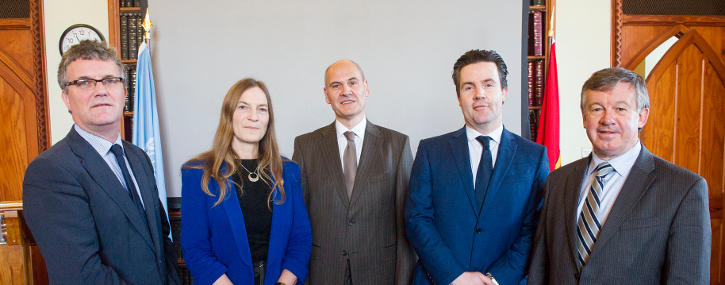In This Section
Water quality monitoring centre launched at UCC

Ireland will be viewed by countries across the globe as a leader in sustainable water management with the launch of the GEMS/Water Capacity Development Centre at UCC last Friday (January 22).
With the deterioration in water quality across the globe, monitoring it has never been more important.
As one of the two new hosts of the GEMS/Water programme [the other is Germany], the Centre will promote and support water quality monitoring and assessment, particularly in developing countries, on behalf of the United Nations Environment Programme (UNEP).
A Centre of the School of Biological, Earth and Environmental Sciences and the ERI at UCC on the Lee Road, Cork, by mid-2016 it will employ five core staff and a network of water experts from the Environmental Protection Agency, DCU, NUI Galway, Trinity College Dublin and Sligo IT.
The importance of GEMS/Water was highlighted in June 2014 by the first UN Environment Assembly, which adopted Resolution 1/9 emphasising the need to build a reliable global freshwater monitoring and information system that will inform global water resources management by expanding the GEMS/Water network. The current network is sparse or completely lacking in many developing countries, especially in Africa.
Dr Debbie Chapman, Director, UNEP GEMS/Water Capacity Development Centre @UCC by the River Lee for the launch pic.twitter.com/Fn3bcFFS7z
— School of BEES, UCC (@uccBEES)
January 27, 2016
“When Ireland was approached as a potential new donor for the programme in 2013, I could see the potential for the centre and its partners to make an important contribution to sustainable management of water resources at the global scale. After two years of negotiations, Ireland, UCC and its partners are now key to the new GEMS/Water programme,” Dr Deborah V Chapman, Director, UNEP GEMS/Water Capacity Development Centre, UCC.
Approximately 1% of the world’s fresh water is easily accessible, but it is not evenly distributed around the world and is vulnerable to contamination from human activities.
The longstanding concept that freshwater is a renewable resource is now compromised by the ongoing deterioration in water quality, leading to the degradation of aquatic ecosystems on which human health, livelihoods and development depend.
News: The launch of the GEMS/Water Capacity Development Centre at UCC. https://t.co/c73LI1YwDi #cork pic.twitter.com/5bLrhZm02p
— UCC Ireland (@UCC)
January 25, 2016
GEMS/ Water, through its partners and work programme, will play an important role in helping developing countries meet the new Sustainable Development Goals. Its primary objective is to ensure compatibility and comparability of water quality data for use in national, regional and global assessments.
“There have been major developments in approaches to water quality monitoring and assessment over the last few decades and we will be bringing GEMS/Water up-to-date by using e-learning technology for training and education programmes that will equip developing countries with the knowledge to make use of the latest approaches to monitoring and managing water quality,” Dr Chapman added.
Dr Hartwig Kremer @UNEP speaks at launch of UN @UCC water capacity development centre @uccBEES @eriucc pic.twitter.com/b1fhQwgXfI
— johalloran (@johbees)
January 22, 2016
Before joining UCC in 1998, Dr Chapman worked for UNEP and WHO in a freelance capacity as a consultant and advisor to the GEMS/Water programme, participating in the first ever global assessment of water quality and production of the internationally successful guidebook on water quality monitoring and assessment.
“Since moving to Ireland, I have been waiting for the right opportunity to establish a global water centre. I never imagined it could be a GEMS/Water Centre. I am the only person currently involved in GEMS/Water who contributed to its development in the 1980s, and that experience is now proving valuable for setting new objectives and directions for the future programme.”
She expressed gratitude to the Department of Environment, Community and Local Government and Irish Aid for “having the vision to support UNEP in keeping GEMS/Water alive.”
School of Biological, Earth and Environmental Sciences
An Scoil Eolaíochtaí Bitheolaíocha, Domhaneolaíocha agus Comhshaoil
Contact us
Distillery Fields, North Mall, University College Cork, Ireland , T23 TK30
